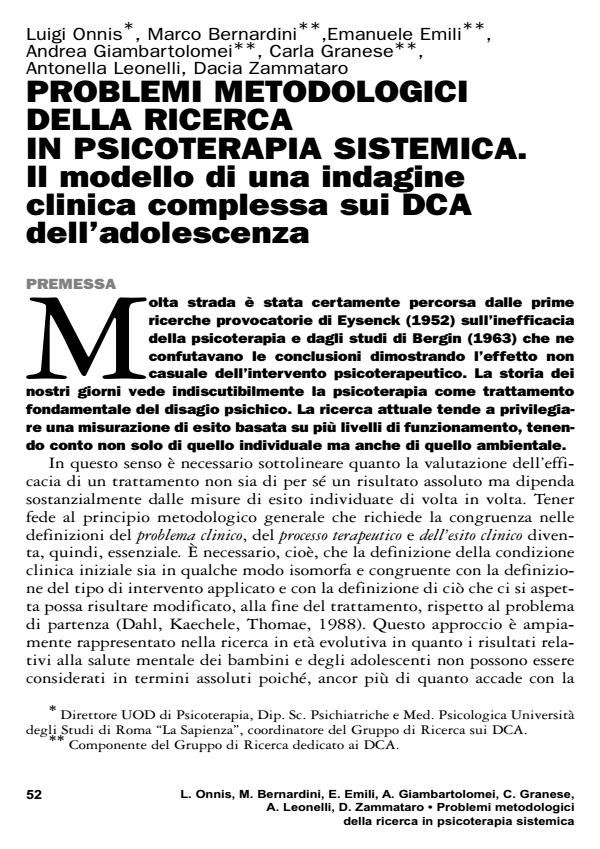Problemi metodologici della ricerca in psicoterapia sistemica. Il modello di una indagine clinica complessa sui DCA dell’adolescenza
Titolo Rivista PSICOBIETTIVO
Autori/Curatori Luigi Onnis, Marco Bernardini,Emanuele Emili, Andrea Giambartolomei, Carla Granese, Antonella Leonelli, Dacia Zammataro
Anno di pubblicazione 2008 Fascicolo 2008/1
Lingua Italiano Numero pagine 22 P. 52-73 Dimensione file 186 KB
DOI
Il DOI è il codice a barre della proprietà intellettuale: per saperne di più
clicca qui
Qui sotto puoi vedere in anteprima la prima pagina di questo articolo.
Se questo articolo ti interessa, lo puoi acquistare (e scaricare in formato pdf) seguendo le facili indicazioni per acquistare il download credit. Acquista Download Credits per scaricare questo Articolo in formato PDF

FrancoAngeli è membro della Publishers International Linking Association, Inc (PILA), associazione indipendente e non profit per facilitare (attraverso i servizi tecnologici implementati da CrossRef.org) l’accesso degli studiosi ai contenuti digitali nelle pubblicazioni professionali e scientifiche.
Methodological problems of the systemic psychotherapy. the model of a complex clinical research about eating disorders in adolescence. In this article about the research in Systemic psychotherapy the Authors introduces the results of a multilevel study in teen-agers with nervous anorexia, in which family, individual and symptomatic characteristic have been considered. The current study is inserted in the picture of a wider systemic research about the effectiveness of an integrated therapeutic strategy for Eating Disorders. Methodology: This is a randomized controlled study of 14 patients with restrictive anorexia and their families divided in two homogeneous groups: experimental and control. The Experimental group has been treated with an integrated treatment: nutritional and medical therapy plus family therapy; the Control group has been treated with nutritional and medical therapy plus psychiatric counseling. The modified Wyltwick Family Task and the Draw a Person Test of Machover, have been used, according to the criterions proposed from Abraham. The clinical parameters related to the anorexia have been followed according to the DSM IV TR. Results and Conclusions: At the end of the treatment session, the experimental group shows encouraging results in the three levels of the study: a strong reduction of the dysfunctional interactions of the family; a more defined gender identity of the patient and a improvement of physical conditions. At the end of a period of 9 months the Control group doesn’t show any progress for all the studied levels. The results have been validated by statistical analysis. Key Words: Teenagers Anorexia, Dysfunctional Interactions Model, Gender Identity Disorder, Integrated Treatment.
Luigi Onnis, Marco Bernardini,Emanuele Emili, Andrea Giambartolomei, Carla Granese, Antonella Leonelli, Dacia Zammataro, Problemi metodologici della ricerca in psicoterapia sistemica. Il modello di una indagine clinica complessa sui DCA dell’adolescenza in "PSICOBIETTIVO" 1/2008, pp 52-73, DOI: